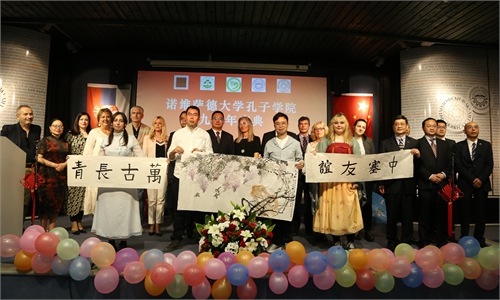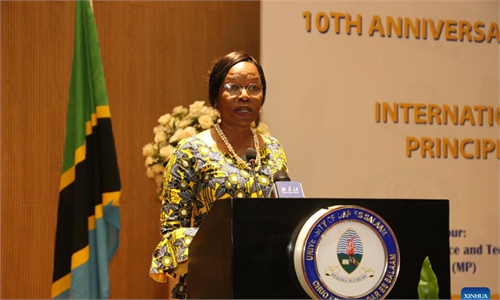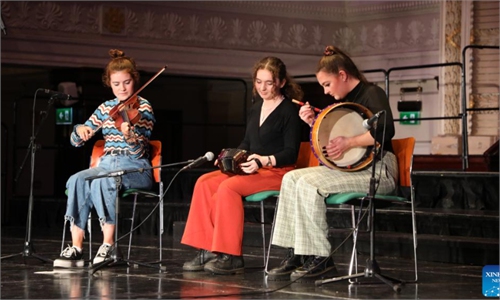IN-DEPTH / IN-DEPTH
Friendship, affection in full bloom: Language, culture exchanges build bridge between China, PICs
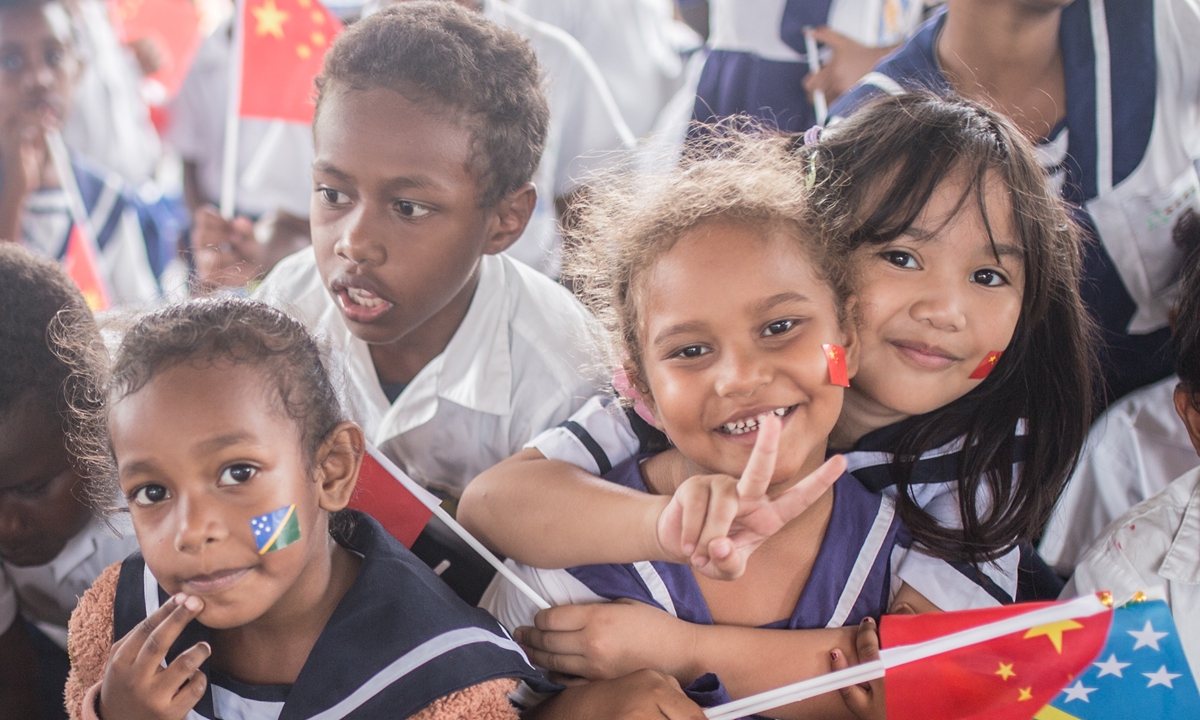
Students welcome visiting guests at the Chung Wah School in Honiara, Solomon Islands on August 22, 2023. Photo: Shan Jie/GT
"I like watching [the Chinese reality show] Running Man, I like [Chinese actress] Dilraba and Chinese hot-pot…" Joanne Cilia Vosalevu, a 23-year-old Fijian woman told the Global Times at the Beijing University of Posts and Telecommunications, where she started her year-long Chinese language study journey on August 16.
As a student from the University of the South Pacific (USP) majoring in IT and business management, Joanne studied Chinese for about three years before coming to China.
"My mom likes China very much and she loves Jackie Chan," Joanne said, noting that her love for Chinese culture was influenced by her mother, especially after she encountered Chinese reality shows and dramas such as Running Man and Go Fighting!
Joanne's Chinese language learning journey started in the Lautoka camp of the Confucius Institute at the USP. "For two hours a week and I kept learning for three years," Joanne told the Global Times.
Joanne's talent in mastering various forms of Chinese art was greatly showcased at the Confucius Institute back home, with outstanding performances in Chinese songs, [Chinese traditional instrument] hulusi flute playing and Chinese painting. As a result, she won the 20th Chinese Bridge Chinese Preliminary Competition in the Fiji region in 2021 and also received an International Chinese Language Teachers Scholarship (CLEC) and the opportunity to study in China for a year.
The CLEC is a non-profit professional educational institution for international Chinese language education, affiliated with the Chinese Ministry of Education. It is committed to providing quality services for people from all over the world to learn Chinese and understand China. It also intends to build a platform for friendly collaboration in language education and cross-cultural learning.
Joanne is the second student at the USP Confucius Institute to receive this honor since the establishment of the scholarship. Just like her favorite Chinese song "Invisible Wings," Chinese has become Jenny's wings, helping her fly higher and further.
Providing an opportunity
The establishment of the Confucius Institute at the USP in 2012 provided an opportunity for people from South Pacific island countries like Joanne, who love China and want to learn Chinese, to learn the language in their own countries.
In mid-August, when Global Times reporters visited the USP Confucius Institute in Suva, Fiji, the reporters were firstly greeted by a Confucius statue erected in front of the institute's office building.
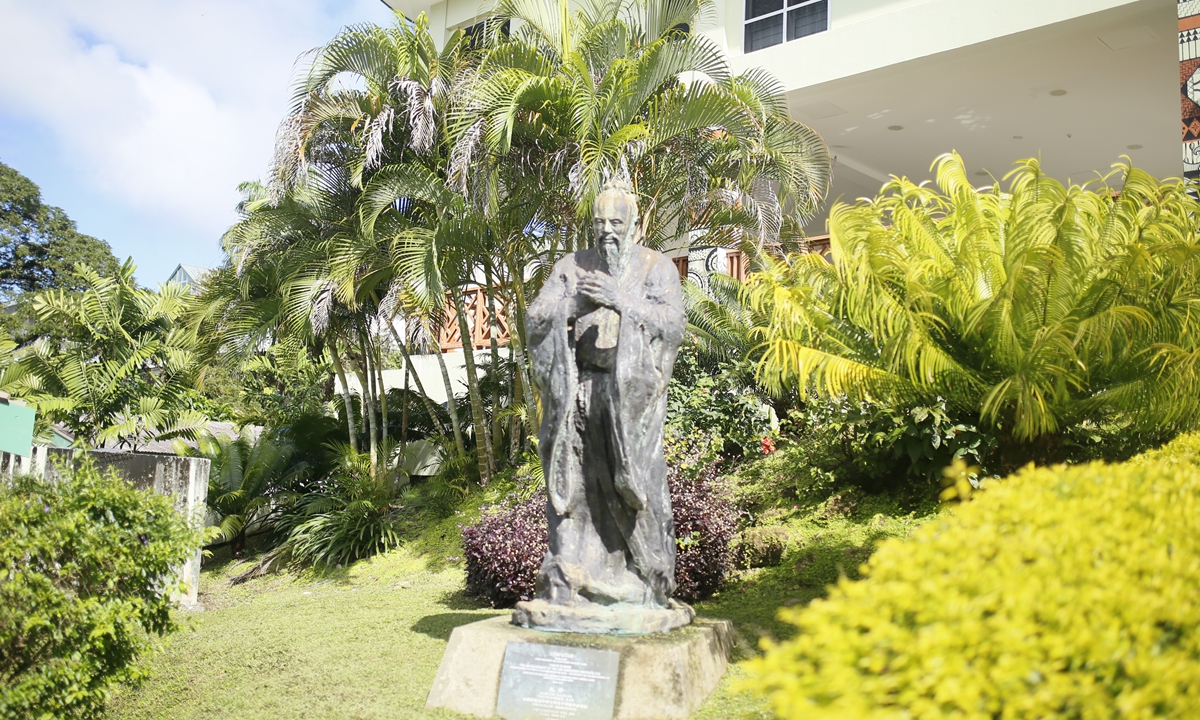
The Confucius statue in Confucius Institute of the University of the South Pacific in Suva, Fiji Photo: Shan Jie/GT
Li Yini, director of the institute, welcomed the reporters in traditional Fijian attire and a flower behind her right ear. "It is a local custom for married women to wear flowers behind their right ear, while unmarried women wear them behind their left ear," Li explained.
Local female staff at the institute said they love Chinese cheongsams. As Li said, the original intention of the establishment of the Confucius Institute was to facilitate understanding between South Pacific island countries and China. Li's sense of style and local women's love for Chinese cheongsams demonstrated that cultural exchanges between China and countries in the South Pacific region have already become integrated into people's daily lives.
The institute provides Chinese courses not only to students at the USP, but also to students at other universities as well as middle and elementary schools, officials and workers from local governmental departments and institutes, and other local residents who are interested in the Chinese language and Chinese culture. "We provide three different levels of courses to people with various Chinese language proficiencies," Li said.
She noted that the institute also provides cultural courses, including in the art of paper cutting, tea art and Chinese painting. These courses allow local students to get a taste of the uniqueness of Chinese culture and build a communication bridge between people on both sides.
The USP is one of only two regional universities in the world and is a leading higher education institution in the South Pacific region. It has branch campuses in 12 regional countries.
Currently, the Confucius Institute at the USP has established Confucius classrooms in Fiji's Lautoka, Vanuatu and the Cook Islands, forming a "three countries, four locations" educational framework. With the promotion of online Chinese credit courses, Chinese language teaching now covers 12 countries in the South Pacific region. Over the last decade, the institute has offered more than 700 international Chinese language courses, taught for more than 20,000 hours and trained at least 10,000 students, according to Li.
The Confucius Institute's commitment to cultivating Chinese language talents in Fiji has also won recognition from the government. Fiji's Minister for Education, Heritage and Arts Rosy Akbar emphasized that China's support and cooperation will help improve Fiji's domestic education system and also contribute to the cultivation of more Chinese language talents to meet future demands for Chinese education, during her visit to the Confucius Institute on August 30.
She also expressed hope that the Confucius Institute at the USP will provide higher quality language courses for Fijian nationals, especially young people, and use language and culture as a medium to promote long-term friendly cooperation and development between the two countries in various aspects.
Eyeing the future
The Chinese language is also facilitating the building of a friendship bridge between China and other regional island countries.
"Let us gently row the oars, the boat pushes waves ashore…"
On August 22, in Chung Wah School, Honiara, Solomon Islands, a group of primary school students performed a well-known children's song in Chinese celebrating friendship to the guests.
The children, dressed in sailor-style uniforms, had Chinese and Solomon Islands national flags painted on their faces, while many of their schoolmates waved the small flags along to the rhythm of the performance.
Chung Wah means "China." The school was founded after World War II by the Chinese community in Solomon Islands. In September 2019, after China and Solomon Islands officially established diplomatic ties, the school raised Solomon Islands' first Chinese national flag.
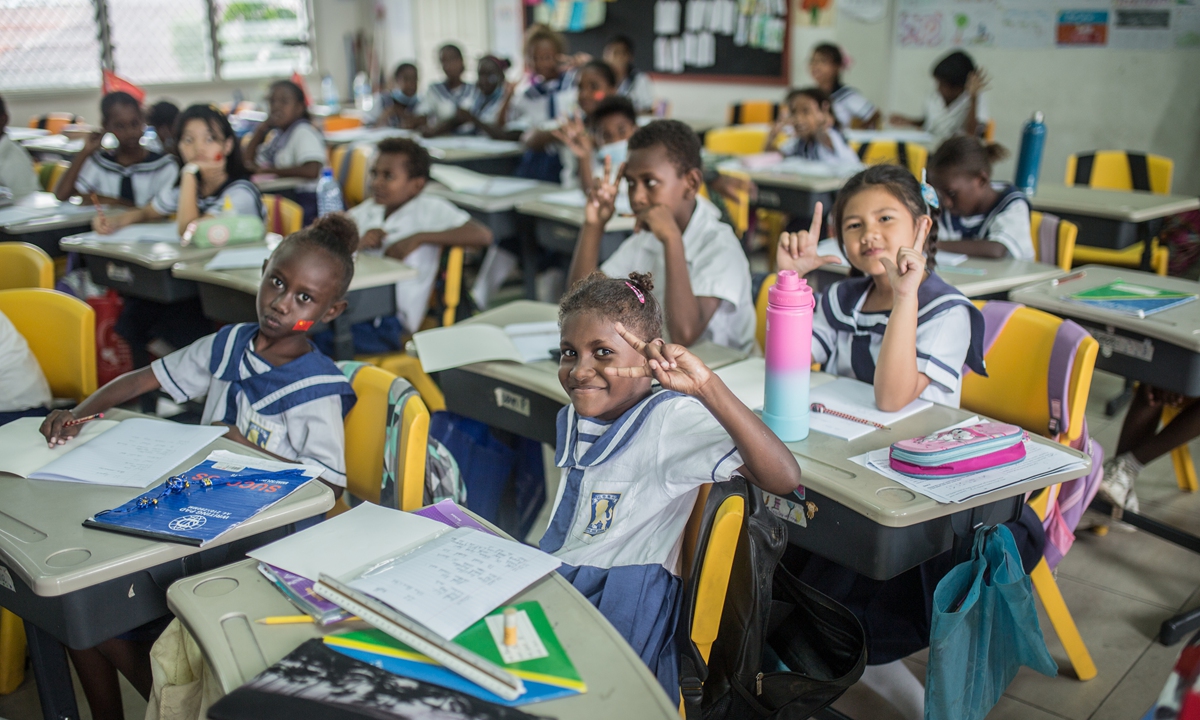
Students at the Chung Wah School in Honiara, Solomon Islands pose for camera on August 22, 2023. Photo: Shan Jie/GT
As a top school in Honiara, the capital of the island nation, the school has hundreds of students. Even though most of them are not ethnically Chinese, they still learn the Chinese language as part of the school's long-standing tradition.
Eunice Tahuniara, the head of the Chung Wah School, believes it is important for her students to be exposed to diverse cultures, especially as ties between China and Solomon Islands have deepened significantly in recent years.
"It is a positive development to see more Chinese people coming here," Tahuniara told the Global Times.
"We are building our friendship and we're strengthening our relationship. It's not just limited to social interactions; we're also expanding into areas like education and various other aspects."
Even though the COVID-19 pandemic caused Chinese language classes to be suspended for two years, the school is expected to continue its proud tradition.
Hannah Liu, a Chinese language teacher, arrived at the school earlier this year all the way from Sweden to Honiara and resumed lessons. More teachers dispatched from China are also expected to join Liu later this year.
"Our students here may, in the future, have the opportunity to engage with Chinese institutions for exchanges or even for teachers to pursue further studies. This way, the friendship can continue to develop and extend beyond our current boundaries," she noted.
In early July, at the opening ceremony of Solomon Islands' Embassy in Beijing, some young Solomon Islanders currently studying at various Chinese universities, dressed in the island nation's traditional attire, joyfully performed traditional dances representing the country's different islands.
Thanks to the support of the Chinese government, many students from Solomon Islands have been able to receive higher education in China in recent years. They are the best example of the people-to-people exchanges taking place between the two countries.
"I meet many helpful people here and I want to study very hard in China," Roxbe Gideon, a student from Solomon Islands in Northwestern Polytechnical University in Northwest China's Shaanxi Province, told the Global Times at the event. Gideon, majoring in civil engineering, said that he would like to follow in his father's footsteps and become an engineer.
Nisi Alexandrick, Gideon's schoolmate, majoring in aeronautics, hopes to use the knowledge he gathers in China to help improve aeronautics or aircraft systems in his home country, in order to improve air transportation.
Just like Gideon and Alexandrick, more and more young islanders are boarding the BRI fast train. This month, another group of outstanding young people from Solomon Islands will head to China to embark on their university journeys.
At a farewell ceremony on September 6, Chinese Ambassador to Solomon Islands Li Ming warmly congratulated the students, encouraging them to experience China's modernization and high-quality development achievements firsthand, delve into the splendidness of Chinese culture, and return to their homeland after completing their studies to contribute their wisdom and strength to the economic and social development of Solomon Islands and the friendly relations between China and Solomon Islands.
Promoting local development
At a local store in Fiji, a shop assistant took the initiative to reveal to Global Times reporters in Chinese, "These products are eligible for tax refunds at the airport." He said that there are now more and more Chinese tourists in the local area in order to provide better service.
Aboard the flight from Nadi to Honiara, a flight attendant asked a Global Times reporter how to say beef and chicken in Chinese. He said he was learning Chinese as the number of Chinese tourists using the airline's services has grown.
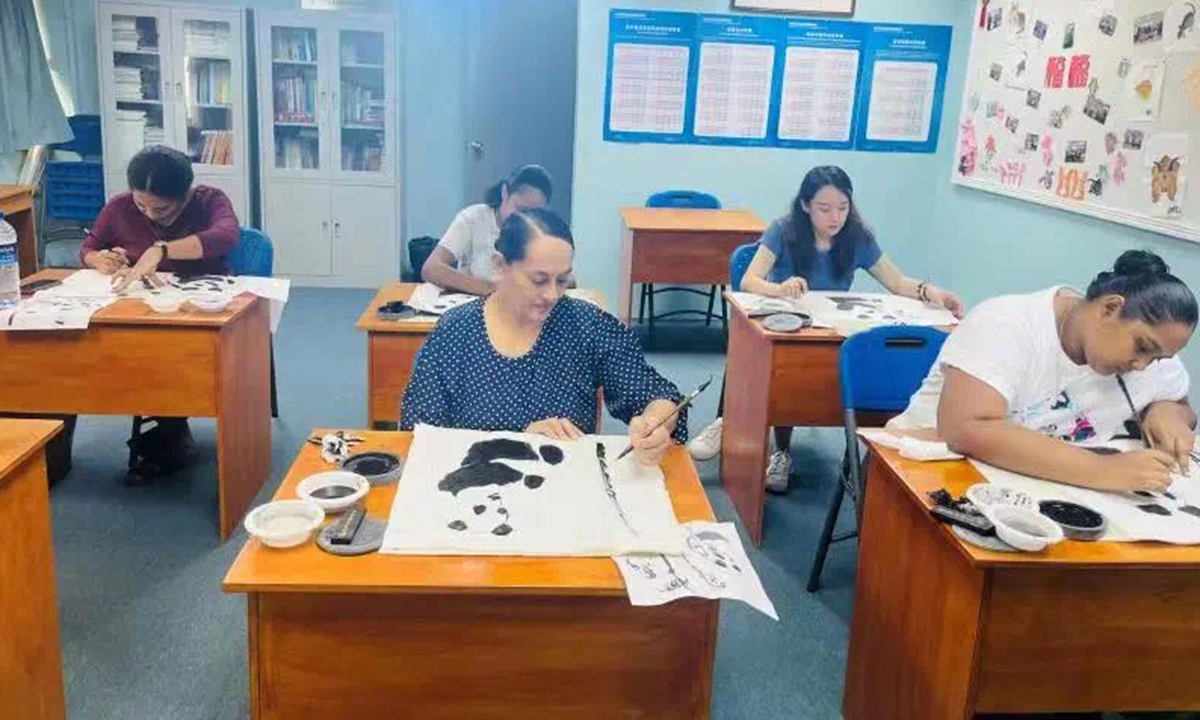
Chinese painting class at the Confucius Institute of the University of the South Pacific in Fiji Photo: Courtesy of Confucius Institute at the USP
With the increasing number of Chinese tourists to the South Pacific region, some local companies also have a growing demand for Chinese language talents. "In May this year, we went to Shangri-La Hotel [in Fiji] to provide 40 hours of training for hotel staff. Now there are more and more Chinese guests and they have practical needs. Many staffers at the hotel also request to come to our classes to learn Chinese," Li Yini told the Global Times.
"Learning Chinese has become a trend in Fiji. The number of people enrolling in our social classes is increasing, sometimes exceeding our maximum capacity, and the classrooms are not enough," Li said.
The ultimate aim of learning Chinese is to foster better cooperation and promote local development.
China has been helping Fiji to construct buildings, roads, and supermarkets. These are very good forms of cooperation that have helped greatly in Fiji's development, Joanne told the Global Times. She noted that Fiji should learn more from China in areas such as technology and culture to promote local development.

